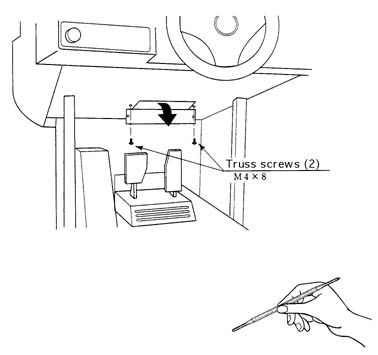
12 . MONITOR
![]() When performing
such work as installing and removing the monitor, inserting and
disconnecting the external connectors to and from monitor interior
and the monitor, be sure to disconnect the power connector (plug)
before starting work. Proceeding the work without following this
instruction can cause electric shock or malfunctioning.
When performing
such work as installing and removing the monitor, inserting and
disconnecting the external connectors to and from monitor interior
and the monitor, be sure to disconnect the power connector (plug)
before starting work. Proceeding the work without following this
instruction can cause electric shock or malfunctioning.
Using the monitor by converting it without obtaining a prior permission is not allowed. SEGA shall not be liable for any malfunctioning and accident caused by said conversion.
PRIMARY SIDE AND SECONDARY SIDE
The monitor's circuit which is divided into the Primary Side
and Secondary Side, is electrically isolated. Do not touch the
Primary Side, or do not touch both the Primary Side and the Secondary
Side simultaneously. Failing to observe the instruction can cause
electric shock and this is very dangerous. When making monitor
adjustments, use a non conductive driver and make adjustment without
touching any part other than the Adjustment V.R. and knob. Also,
be sure not to cause a shortcircuit to the Primary Side and Secondary
Side. If short circuited, it can cause electric shock or malfunctioning,
which is very dangerous.
HIGH TENSION VOLTAGE
Some parts inside the monitor are subject to high tension voltage
inexcess of 20,000 volts and very dangerous. Therefore, do not
touch the monitor interior. Should soldering & paper wastes,
etc., be mixed in the monitor interior, turn power off so as not
to cause malfunctioning or fire hazard.
CONNECTING THE CRT AND PCB
For combining the CRT and PCB, use specified part no. to maintain
the status of adjustments made at the factory. The anode of the
CRT itself will be accumulatively charged as time elapses, generating
high-tension voltage which is very dangerous. The monitor should
be used with the Chassis, CRT and PCB assembled. When repair,
etc. is required at the time of malfunctioning. Be sure to send
it in an "as assembled" condition. If these are disassembled,
what's charged to said high tension voltage can be discharged,
causing a very hazardous situation. Therefore, under no circumstances
should it be disassembled.
STATIC ELECTRICITY
Touching the CRT surface sometimes causes you to slightly feel
electricity. This is because the CRT surfaces are subject to static
and will not adversly affect the human body.
INSTALLATION AND REMOVAL
Ensure that the Magnetizer Coil, FBT (Fly-Back Transformer), Anode
Lead and Focus Lead are not positioned close to the sheet metal
work's sharp edges, etc. and avoid damaging the insulated portions
so as not to cause electric shock and malfunctioning.
![]() For the purpose
of static prevention, special coating is applied to the CRT face
of this product. To protect the Coating, Pay attention to the
following points. Damaging the coating film can cause electric
shock to the customers. For the caution to be heeded when cleaning,
refer to the Section of periodic inspection table.
For the purpose
of static prevention, special coating is applied to the CRT face
of this product. To protect the Coating, Pay attention to the
following points. Damaging the coating film can cause electric
shock to the customers. For the caution to be heeded when cleaning,
refer to the Section of periodic inspection table.
Do not apply or rub with a hard item (a rod with pointed edge, pen, etc.) to or on the CRT surfaces.
Avoid applying stickers seals, etc. on the CRT face.
Do not remove aluminum foils from the CRT corners. Removing the aluminum foils can cause static prevention effects to be lowered.
CAUTIONS TO BE HEEDED WHEN CLEANING THE CRT SURFACES
Static preventive coating is applied to the CRT surfaces. When
cleaning, pay attention to the following points;
Peeling off static preventive coating can cause electric shock.
Remove smears by using a dry, soft cloth (flannels, etc.). Do not use a coarse gauze, etc.
For smear removing solvent, alcohol (ethanol) is recommended.
When using chemical detergent be sure to follow instructions to
follow;
Dilute chemical detergent with water and dip a soft cloth in and
the thoroughly wring iot to wipe smears off.
Do not use chemical detergent containing abradent, powder or bleaching
agent.
Do not use alkaline chemical detergents such as "glass cleaner"
available on the market or solvents such as thinner, etc.
Do not rub or scratch the CRT face with hard items such as brushes, scrub brush, etc.
ADJUSTMENT METHOD
Monitor adjustments have been made at the time of shipment. Therefore, do not make further adjsutment without a justifiable reason. Adjusting the monitor which contains high tension parts is dangerous work. Also, an erroneous adjustment can cause deviated synchronization and image fault, resulting in malfunctioning. When making adjustment, utilize a resinous Alignment rod. Servicing with bare hand or using conductive tools can cause electric shock.
